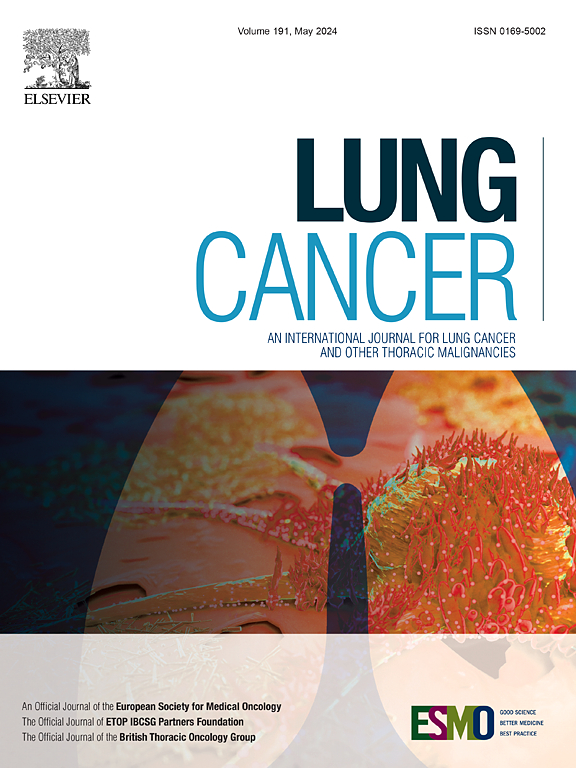提高神经元特异性烯醇化酶对小细胞肺癌的筛查能力。
IF 4.5
2区 医学
Q1 ONCOLOGY
引用次数: 0
摘要
神经元特异性烯醇化酶(Neuron-specific enolase, NSE)是小细胞肺癌(small cell lung cancer, SCLC)最常见的生物标志物之一,广泛应用于肺癌筛查。但其特异性受多种因素影响。利用残差校正和机器学习技术,根据南京医科大学第一附属医院48009名健康个体的训练集中影响NSE的代谢因素和吸烟史,构建校正后的NSE及其参考范围。外部验证包括额外的64,553名健康受试者和105名SCLC患者,以评估nsecrected用于SCLC筛查的有效性。nseccorrected的参考范围可以显著提高NSE对SCLC的特异性,减少假阳性。在外部验证集中,nseccorrected将特异性从85.71%提高到97.09% (P corrected具有更好的筛选效果)。nseccorrected的计算被转换成一个基于r的在线应用程序,更方便使用。NSEcorrected可以提高SCLC的筛查效果,降低假阳性率,更适合大人群筛查,优化肺癌资源配置。本文章由计算机程序翻译,如有差异,请以英文原文为准。

Improving the screening ability of neuron-specific enolase on small cell lung cancer
Neuron-specific enolase (NSE) is one of the most common biomarkers of small cell lung cancer (SCLC) and is widely used in lung cancer screening. But its specificity is affected by many factors. Using residual correction and machine learning, corrected NSE and its reference range were constructed based on metabolic factors and smoking history affecting NSE in the training set of 48,009 healthy individuals recruited from the First Affiliated Hospital of Nanjing Medical University. External validation including additional 64,553 healthy subjects and 105 SCLC patients were enrolled to evaluate the efficacy of NSEcorrected for SCLC screening. The reference range of NSEcorrected could significantly improve the specificity of NSE for SCLC and reduce false positives. In the external validation set, NSEcorrected increased the specificity from 85.71 % to 97.09 %(P < 0.0001), and reduced the false positive rate from 14.26 % to 2.91 %(P < 0.0001). ROC curve, calibration curve and decision analysis curve also showed that NSEcorrected had better screening performance. The calculation of NSEcorrected was converted into an online R-based app for more convenient use. NSEcorrected can improve the screening effect of SCLC, reduce the false positive rate, and is more suitable for large population screening and optimize the allocation of lung cancer resources.
求助全文
通过发布文献求助,成功后即可免费获取论文全文。
去求助
来源期刊

Lung Cancer
医学-呼吸系统
CiteScore
9.40
自引率
3.80%
发文量
407
审稿时长
25 days
期刊介绍:
Lung Cancer is an international publication covering the clinical, translational and basic science of malignancies of the lung and chest region.Original research articles, early reports, review articles, editorials and correspondence covering the prevention, epidemiology and etiology, basic biology, pathology, clinical assessment, surgery, chemotherapy, radiotherapy, combined treatment modalities, other treatment modalities and outcomes of lung cancer are welcome.
 求助内容:
求助内容: 应助结果提醒方式:
应助结果提醒方式:


